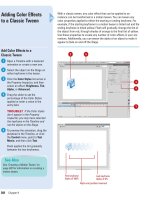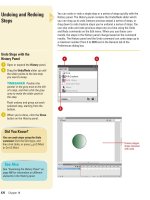Tài liệu Thiết kế flash với flash cs5 part 80 doc
Bạn đang xem bản rút gọn của tài liệu. Xem và tải ngay bản đầy đủ của tài liệu tại đây (647.59 KB, 5 trang )
ptg
488
Chapter 20
When you publish a Flash document, you're not limited to just the cre-
ation of the Flash movie, you can instruct Flash to create a GIF image of
the Flash movie, based on the currently selected frame. The GIF file for-
mat (Graphics Interchange Format) is used primarily for clipart, text,
and line art, or for images that contain areas of solid color. Once the
image is created, you can open and use it in any application that sup-
ports the GIF file format.
Specifying GIF
Options
Specify GIF Options
Select a specific frame on the
Timeline.
Click the File menu, and then click
Publish Settings.
Select the GIF check box, and then
click the GIF tab.
Enter a Width and Height (in
pixels) for the JPEG image, or
select the Match Movie check box
to create a JPEG image that
matches the size of the Flash
movie.
Select from the following Playback
options:
◆
Static. Prevents the GIF
animation from playing.
◆
Animated. Animates the GIF
document.
◆
Loop Continuously. Forces the
animation into a continuous
loop.
◆
Repeat. Enter a value
representing the number of
times the file loops.
5
4
3
2
1
3
5
4
From the Library of Wow! eBook
ptg
Chapter 20 Publishing a Movie
489
Select from the following Options:
◆
Optimize Colors. Creates an
optimized (smaller) set of colors
for the active document.
◆
Interlace. Creates an interlaced
image where the file, when
displayed on a Web page, loads
in three passes.
◆
Smooth. Uses a color dithering
scheme to create visually
smoother color transitions.
◆
Dither Solids. Dithers (mixes)
solid colors if they fall outside
of the viewable color gamut.
◆
Remove Gradients. Removes
gradients from the active
image.
Click the Transparent list arrow,
and then click Opaque,
Transparent, or Alpha.
The Alpha transparency mask
generates transparent areas
within the GIF image.
Click the Dither list arrow, and
then click None, Ordered, or
Diffusion.
Click the Palette Type list arrow,
and then click Web 216, Adaptive,
Web Snap Adaptive, or Custom.
Enter a number for the Maximum
Colors.
This is available for Adaptive and
Web Snap Adaptive. Flash lets you
select how many colors are
available for the image's color
table.
Click to select a color table file for
the Custom Palette Type.
Click OK to save the GIF settings.
12
11
10
9
8
7
6
6
8
7
9
12
10
11
Option Use
Web 216 Creates an image with only Web Safe
colors.
Adaptive Creates an image where the color table
(CLUT) adapts to the image colors.
Web Snap Adaptive Creates a color table that adheres
closely to the Web Safe Color palette.
Custom Creates a customized color palette.
Palette Type Options
From the Library of Wow! eBook
ptg
490
Chapter 20
When you publish a Flash document, you're not limited to just the cre-
ation of the Flash movie. You can instruct Flash to create a PNG image
of the Flash movie, based on the currently selected frame. The PNG file
format (Portable Network Graphic) is a hybrid format designed to save
clip art, photographic images, text, and line art. Once the image is
created, you can open and use it in any application that supports the
PNG file format.
Specifying PNG
Options
Specify PNG Options
Select a specific Frame on the
Timeline.
Click the File menu, and then click
Publish Settings.
Select the PNG check box, and
then click the PNG tab.
Enter a Width and Height (in
pixels) for the PNG image, or
select the Match Movie check box
to create a PNG image that
matches the size of the Flash
movie.
Click the Bit Depth list arrow, and
then select 8-bit, 24-bit, or 24-bit
With Alpha.
Select from the following Options:
◆
Optimize Colors. Creates an
optimized (smaller) set of colors
for the active document.
◆
Interlace. Creates an interlaced
image where the file, when
displayed on a Web page, loads
in three passes.
◆
Smooth. Uses a color dithering
scheme to create visually
smoother color transitions.
◆
Dither Solids. Dithers (mixes)
solid colors, if the colors fall
outside of the viewable color
gamut.
◆
Remove Gradients. Remove any
gradients from the active
image.
6
5
4
3
2
1
3
4
6
5
Option Selection
8-bit Maximum of 256 colors
24-bit Maximum of 16.7 million colors
24-bit with Alpha Maximum of 16.7 colors and supports
the alpha transparency
Bit Depth Choices
From the Library of Wow! eBook
ptg
Chapter 20 Publishing a Movie
491
Click the Dither list arrow, and
then click None, Ordered, or
Diffusion to dither (mix) colors that
fall outside the viewable color
gamut.
Click the Palette Type list arrow,
and then click Web 216, Adaptive,
Web Snap Adaptive, or Custom to
select a specific palette type.
Enter a number for the Maximum
Colors.
This is available for Adaptive and
Web Snap Adaptive. Flash lets you
select how many colors are
available for the image's color
table.
Click to select a color table file for
the Custom Palette Type.
Click the Filter Options list arrow,
and then select from the available
filter options to control the filtering
of the colors in the active image.
Click OK to save the PNG settings.
12
11
10
9
8
7
7
8
10
12
9
11
From the Library of Wow! eBook
ptg
492
Chapter 20
When you publish a Flash document, you're not limited to just the cre-
ation of the Flash movie, you can instruct Flash to create a JPEG image
of the Flash movie, based on the currently selected frame. The JPEG
file format (Joint Photographic Experts Group), is used primarily to
reduce the size of photographic images. Once the image is created,
you can open and use it in any application that supports the JPEG file
format. You can select a quality option to compress the file size, which
reduces download time over the Internet. You can specify a quality
value between 1 and 100. A higher value preserves image quality, but
retains a higher file size.
Specifying JPEG
Options
Specify JPEG Options
Select a specific frame on the
Timeline.
Click the File menu, and then click
Publish Settings.
Select the JPEG check box, and
then click the JPEG tab.
Enter a Width and Height (in
pixels) for the JPEG image, or
select the Match Movie check box
to create a JPEG image that
matches the size of the Flash
movie.
Drag the Quality slider to increase
or decrease the amount of
compression applied to the image.
The lower the value, the more
information (quality) is removed
from the image.
Select the Progressive check box
to create a progressive JPEG
image. The file, when displayed on
a Web page, loads in three passes.
Click OK to save the JPEG settings.
7
6
5
4
3
2
1
3
4
5
7
6
From the Library of Wow! eBook









